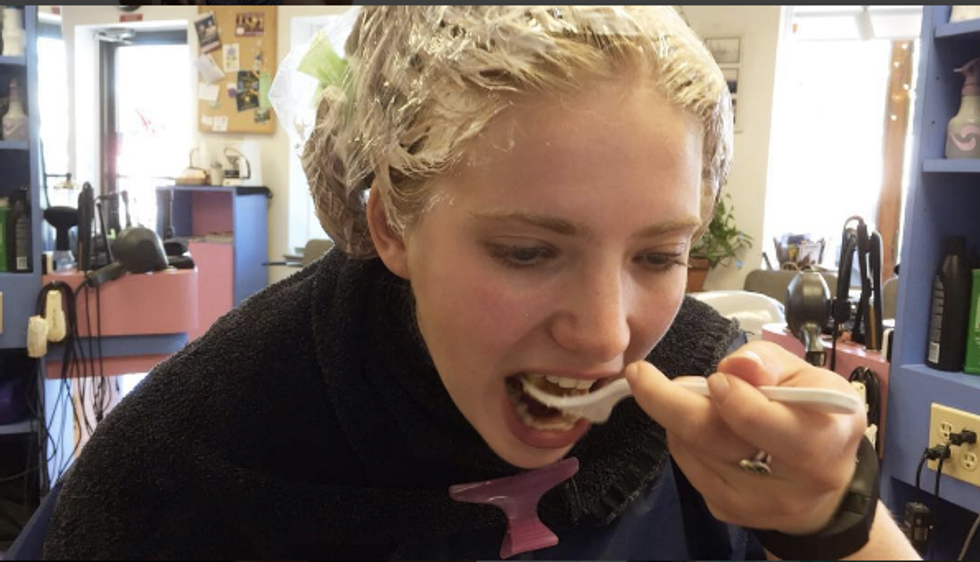This article reaches you today from a sticky, vinyl salon chair in Media, PA where my hair begins its journey from jet black back into its natural blond. Waiting for a timer to go off, I look in the salon mirrors that surround me; floor to ceiling mirrors, mirrors in front of and behind me, mirrors that will come to disorient me in my four hours spent at this salon. I watch as my eyes become bluer and my cheekbones become more defined. I enjoy the gentle tingle of the bleach on my scalp and the hairdresser telling me about getting her vacation photos blown up to hang around her small mom-and-pop salon. My hair has only been in the hands of professionals four times, each time at a different place. While I have loved the results every time my hair has been done professionally, I wonder why people pay so much for their hair. My experience with black hair helps me know why: more dramatically than any other hair transformation I’ve experienced, people treated me extremely differently when I dyed my hair black this past April.
I’ve dyed my hair on and off since the age of 8, mostly in crazy colors, my favorite being hot-hot pink. However, as a punky mall goth child with naturally blond hair, I always dreamt of having black hair. This color, I believed, would show who I truly am more accurately; it’s more serious and confident than what society believes the hair color blond to display. In effect, many black wigs have found their way into my closet, but they never fully satisfied my want for black hair, as they didn’t match my hair’s natural texture. Nevertheless, the idea of hair being inexorably linked to identity had somewhat faded with age, knowing I had created myself to be capable and self-assured and that my hair had nothing to do with that process. My decision to dye my hair black then was not because I believed people would take me more seriously or because I thought it could magically give me more confidence, this decision was made more out of nostalgia for my eight-year-old self and a genuine curiosity of what I would look like.
What I failed to realize was how much society unconsciously connected identity and hair. The first day that I went out with black hair was one of the strangest of my life; both people I had known for awhile and people whom I had never met before spoke to me in a manner that was more forward and direct, making me seem more knowledgeable and severe, than when I was blond. That day, I made my weekly run to my favorite coffee shop near Pratt’s campus where the baristas, owner, and I are on a first-name basis. This may have only been a coincidence, but that day I had the longest conversation ever with them in which they all seemed more at ease and talked in a way that was more clear than when I had come in with blond hair. Throughout the first week of having black hair, I noticed subtle shifts such as the case above with the people around me. These instances were subtle enough that they have become difficult to articulate, especially in my attempt to remember them from three months ago. I just remember my feelings of confusion and sincere relief that people were finally treating me in the way I had always wanted to be treated: in a straightforward manner and on the same plane as the person(s) with whom I’m speaking.
Here I am again though, going back to blond at the request of my mother because I have my cousin’s wedding to go to in two weeks. Oddly enough, I’m not worried of people treating me differently; I’m just worried about whether or not my head will explode from all the toner that burns my scalp. As I transform back into a blond haired woman, I think of Madonna and what an unstoppable force she is with her “blond ambition” (one of Madonna’s world tours is titled the Blond Ambition World Tour) and can’t wait to have my hair back to its natural color.






















